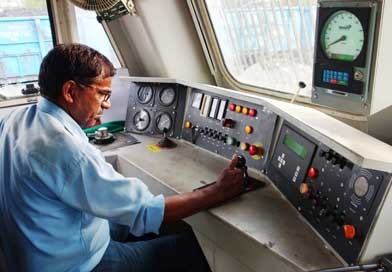The Indian Railways has turned down a longstanding request by Loco Pilots for formal meal and restroom breaks during duty hours. Based on recommendations from a high-level committee, the Railway Board concluded that providing such breaks is not operationally feasible. This decision comes in the wake of multiple train accidents across India, where human error has frequently been cited as the cause.

Surveillance System Deemed Justified
The Railways also defended the use of the Crew Voice & Video Recording System (CVVRS) in locomotive cabins. Officials stated that the system is intended to aid in post-incident analysis and ensure safer operations—not to monitor personal behavior. The Railway Board assured that CVVRS does not add to crew workload and is meant solely to enhance operational safety.
Speed Threshold for High-Speed Trains Raised
Following a multi-disciplinary committee’s suggestions, the classification for High-Speed Trains has been raised from 110 kmph to 130 kmph. The committee also recommended deploying Assistant Loco Pilots on Mainline Electric Multiple Unit (MEMU) trains covering distances over 200 km.

Workers’ Associations Raise Concerns
The All India Loco Running Staff Association (AILRSA) strongly opposed the Railway Board’s decisions. Secretary-General K.C. James criticized the committee for failing to assess the increased mental and physical stress Loco Pilots endure, especially with the revised speed norms. The association called the refusal to provide bathroom breaks—despite the lack of toilet facilities in locomotives—unacceptable.
Long Hours Without Relief
AILRSA highlighted the extreme working conditions of Loco Pilots, who sometimes operate superfast trains non-stop for 6-7 hours. For example, a crew operating the New Delhi–Chennai Tamil Nadu Express from Vijayawada at 11:10 p.m. must continue without a stop until 6:35 a.m. in Chennai. The situation is more severe for female Loco Pilots, who face additional challenges on high-density routes with no scheduled halts.
Impact on Alertness and Safety
AILRSA officials stressed that the inability to eat or use the restroom affects concentration and can reduce alertness—an essential requirement for train operation. The association noted that several accident investigations have recommended reviewing Loco Pilots’ working hours and conditions.
Privacy Concerns Over Video Monitoring
The use of CVVRS has also drawn criticism for being invasive. According to AILRSA, the video footage has been misused to discipline Loco Pilots for behaviors such as yawning or body posture, unfairly suggesting negligence or fatigue.
